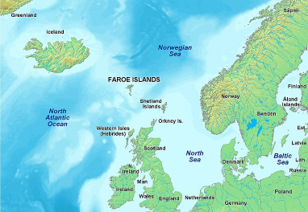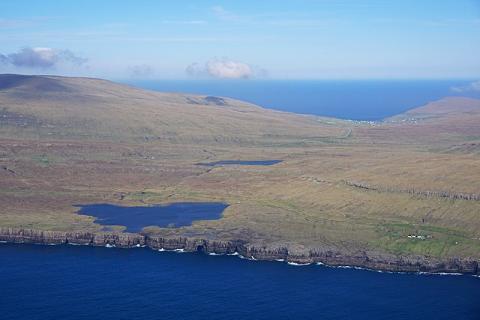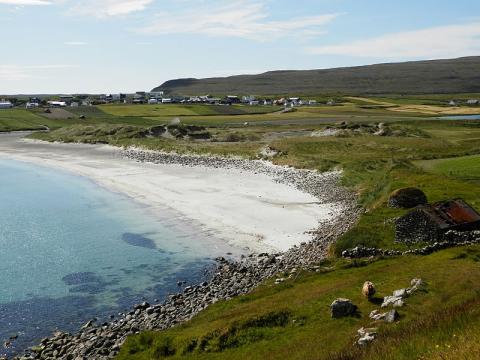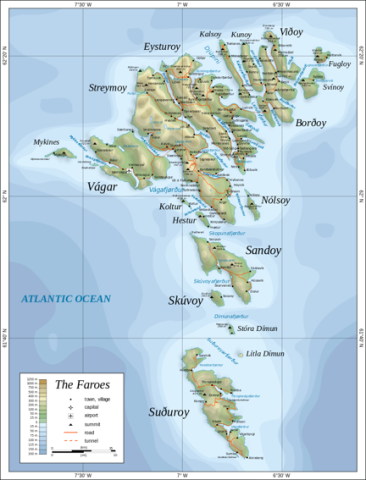[1] Quādam diē vīdērunt īnsulam nōn longē ab illīs; cumque coepissent nāvigāre ad illam īnsulam, subvēnit illīs prōsper ventus in adiūtōrium, ut nōn labōrāssent plūs quam vīrēs poterant sustinēre. [2] Cumque nāvis stetisset in portū, praecēpit vir Deī omnēs exīre forās; ipse autem ēgressus est post illōs.
[3] Cumque coepissent circuīre illam īnsulam, vīdērunt aquās largissimās mānāre ex dīversīs fontibus plēnās piscibus. Dīxit sānctus Brendānus frātribus suīs: [4] “Faciāmus hīc opus dīvīnum; sacrificēmus Deō agnam immaculātam, quia hodiē est Coena Dominī.” Et ibi mānsērunt usque in Sabbatum Sānctum Paschae.
[5] Perambulantēs autem illam īnsulam, invēnērunt dīversōs gregēs ovium ūnīus colōris, idest albī, ita ut nōn possent ultrā vidēre terram, prae multitūdine ovium. [6] Convocātīs frātribus suīs, sānctus Brendānus dīxit illīs: “Accipite quae sunt necessāria ad diem fēstum dē grege.” [7] Frātrēs vērō festīnābant, secundum mandātum virī Deī, ad gregem: quī statim accēpērunt dē grege ūnam ovem.
notes
The Island of Sheep. They land on a nearby island, and plan to celebrate Mass / Holy Communion because it is Maundy Thursday (the anniversary of the Last Supper). They discover an enormous quantity of sheep, and Brendan tells the monks to select one sheep for a feast.
The island has been associated with one of the larger Faroe Islands.The Faroes were famous for their sheep, and may have been visited by Irish monks in the 7th century, before the arrival of settlers from Scandinavia.
[2] ipse autem ēgressus est post illōs: usually Brendan lands first; here he is one of the group (indeed a follower). Orlandi and Guglielmetti (2014) suggest that this is because he knows they will be celebrating Easter on the island, though that doesn’t seem a complete explanation.
[4] opus dīvīnum: i.e., divine service, mass.
sacrificēmus Deō agnam immaculātam: it is unclear whether we are to understand that the monks literally sacrificed an animal victim; in the later Middle Ages an actual lamb could be blessed at the Easter service. But it seems more likely that the language here is figurative. (In the Christian tradition, Christ is regularly referred to as a spotless lamb sacrificed for mankind.) See also on 15.11.
Coena Dominī: i.e., Maundy Thursday / Holy Thursday, the commemoration of the Last Supper. It is appropriate, symbolically, that the travellers have arrived at an island full of sheep, since the Last Supper and the Eucharist / Mass / Holy Communion were associated with the sacrifice of a sheep, as a metaphor for Christ’s sacrifice. See 1 Corinthians 5.7-8: “For Christ, our Pasch, is sacrificed. Therefore let us feast not with the old leaven nor with the leaven of malice and wickedness but with unleavened bread of sincerity and truth.”
Sabbatum Sānctum Paschae: i.e., Holy Saturday, the day before Easter.
[5] ut nōn possent ultrā vidēre terram: they couldn’t see the ground (terram) because they couldn’t see past (ultrā) the many sheep.
prae multitūdine ovium: the sheep are looked after by the procurator, reminding us of Christ as the Good Shepherd (Rumsey 2007, 184).
[6] Accipite ... dē grege: = Accipite dē grege (illa) quae sunt necessāria ad diem fēstum. The word order is unusual.
vocabulary
| nāvigō nāvigāre nāvigāvī nāvigātus | to go by ship, sail; to row 1 |
| subveniō subvenīre subvēnī subventum | to aid |
| prōsper or (more frequently) prōsperus –a –um |
(of winds) favorable |
| adiūtōrium –ī n. | help, aid |
| stō stāre stetī statum | to stand; to stand firm (OLD 3a) 2 |
| portus portūs m. | harbor |
| forās | outside, on the outside |
| circumeo (circueō ) –īre –iī (–īvī) circuitus | to go around 3 |
| largus –a –um | bountiful, lavish |
| mānō mānāre mānāvī mānātus | to flow; pour |
| piscis piscis m. | fish |
| faciō facere fēcī factus | to do, make; to act, conduct oneself (OLD 28) 4 |
| dīvīnus –a –um | divine |
| sacrificō –āre | to offer a sacrifice |
| agna agnae f. | ewe lamb |
| immaculātus –a –um | unstained |
| quia | because; that |
| cēna (coena) cēnae f. | dinner |
| ūsque | until (often with ad or dum) |
| Sabbata –ōrum n.pl. | the Sabbath; Saturday (LL) |
| pascha –ae f. | Easter (LL) |
| perambulō perambulāre perambulāvī perambulātus | to go through 5 |
| grex gregis m. | herd, flock |
| ovis –is n. | sheep |
| prae (prep. + abl.) | in front of, in the face of (ML); by means of, because of, in view of |
| ovis –is n. | sheep |
| convocō convocāre convocāvī convocātus | to call together 6 |
| necessārius –a –um | necessary, essential |
| fēstīvus –a –um | festal, relative to a feast day |
| grex gregis m. | herd, flock |
| festīnō festīnāre festīnāvī festīnātus | to hurry 7 |
| secundum | after, behind, according to (+ acc.) |
| mandātum –ī n. | instruction, order |
| grex gregis m. | herd, flock |
| ovis –is n. | sheep |




